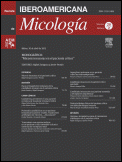
REVISTA IBEROAMERICANA DE MICOLOGIA
metrics 2024
Cultivating Insights in Mycology for Global Health
Introduction
REVISTA IBEROAMERICANA DE MICOLOGIA, published by the ASOCIACION ESPANOLA MICOLOGIA-AEM, is a vital resource for those engaged in the study of mycology and infectious diseases. With a history spanning from 1996 to 2024, this journal is committed to advancing knowledge in the field through the dissemination of high-quality research articles, reviews, and case studies. Although it currently features a Q3 ranking in Infectious Diseases and a Q4 ranking in Microbiology for 2023, its impact is significant given the niche focus it serves, catering to a specialized audience of researchers and practitioners. While access is not open, the journal continues to be a preferred platform for scholarly communication among professionals in Spain and beyond. The editorial office, located in Bilbao, serves as the hub for rigorous peer-review and publication processes, ensuring that the latest advancements and findings in the field of mycology are effectively shared within the scientific community.
Metrics 2024
 0.33
0.33 1.50
1.50 1.50
1.50 49
49Metrics History
Rank 2024
Scopus
IF (Web Of Science)
JCI (Web Of Science)
Quartile History
Similar Journals
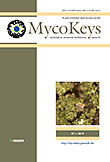
MycoKeys
Exploring the hidden world of fungi and their impact.MycoKeys, published by PENSOFT PUBLISHERS, is a leading open-access journal dedicated to advancing the understanding of fungal biology and its diverse implications within agricultural, ecological, and biological sciences. With its ISSN 1314-4057 and E-ISSN 1314-4049, this journal has achieved remarkable academic prestige, reflected in its 2023 Scopus rankings placing it in the first quartile (Q1) across several categories, including Agricultural and Biological Sciences (miscellaneous), Ecology, Evolution, Behavior and Systematics, and Plant Science. MycoKeys provides a platform for researchers, professionals, and students interested in the latest findings and methodologies regarding fungi, their environments, and their interactions within various ecosystems. Since its transition to open access in 2011, the journal has championed the dissemination of high-quality research to a global audience, fostering collaboration and innovation in mycology. With a publishing history that converges from 2015 to 2024, MycoKeys remains a vital resource for those committed to exploring the multifaceted roles fungi play in our world.

Malaysian Journal of Microbiology
Advancing Microbial Knowledge for a Healthier TomorrowMalaysian Journal of Microbiology is a prestigious open-access journal dedicated to advancing the field of microbiology, published by the Malaysian Society for Microbiology. Since its inception in 2005, this journal has become an essential platform for researchers and practitioners, facilitating the dissemination of innovative studies in applied microbiology, biotechnology, and infectious diseases. Based in Penang, Malaysia, this journal not only focuses on local microbiological research but also positions itself within the broader global scientific community. Although currently placed in the Q4 category in several relevant fields—including Applied Microbiology and Biotechnology, Infectious Diseases, and Medical Microbiology according to the 2023 Scopus rankings—it plays a crucial role in encouraging novel research and fostering collaboration among scientists. The journal encourages submissions that contribute to the understanding of microbial processes, disease mechanisms, and novel biotechnological applications, thereby supporting the continuous growth of knowledge in microbiology. With open access since its launch, the Malaysian Journal of Microbiology ensures that all published works are freely available to the public, enhancing their visibility and impact within the scientific community.
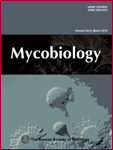
MYCOBIOLOGY
Advancing Knowledge in Mycology and BeyondMYCOBIOLOGY is an esteemed open-access journal published by Taylor & Francis Ltd, specializing in the fields of Infectious Diseases, Microbiology, and Plant Science. Since its inception, the journal has provided a platform for innovative research, showcasing a diverse range of studies that delve into the complexities of mycology and its vast implications on health, agriculture, and the environment. With a commendable impact factor and a Q2 ranking in Plant Science as of 2023, MYCOBIOLOGY facilitates the dissemination of vital findings to a global audience of researchers, professionals, and students. In addition to its commitment to high-quality content, MYCOBIOLOGY has embraced open access since 2018, ensuring that the latest advancements in mycological research are readily available to the academic community and the public. By bridging gaps in knowledge and fostering collaboration across disciplines, MYCOBIOLOGY plays a crucial role in advancing our understanding of fungal biology and its myriad applications.

FUNGAL DIVERSITY
Exploring the Unseen: The Science of FungiFungal Diversity is a premier academic journal dedicated to advancing the science of mycology, encompassing ecological, evolutionary, and biological research involving fungi. Published by Springer, this journal has established a significant presence in the academic community since its inception in 1998, and it continues to thrive with a convergence period extending to 2024. Holding a prestigious Q1 ranking in several categories — including Ecology, Ecology, Evolution, Behavior and Systematics, and Plant Science — Fungal Diversity showcases cutting-edge research that influences ecological management, conservation, and biodiversity studies. With its notable positions in Scopus rankings, including being ranked #1 in Environmental Science - Ecology, the journal serves as an essential resource for researchers, professionals, and students interested in the complex interplay between fungi and their environments. Although it does not currently offer open access, interested readers can benefit from the journal's rich repository of peer-reviewed articles, making Fungal Diversity a vital component of the scientific literature landscape.

MYCOSCIENCE
Fostering Innovation in Mycological ResearchMYCOSCIENCE, published by the Mycological Society of Japan, is a prominent peer-reviewed journal that serves as an essential resource in the fields of ecology, evolution, behavior, and systematics, highlighted by its Q2 ranking in the 2023 category quartiles. Established in 1994 and continuing through 2024, the journal focuses on mycological research, providing insights into the interconnected worlds of fungi and their ecological roles. With an ISSN of 1340-3540 and an E-ISSN of 1618-2545, MYCOSCIENCE aims to disseminate high-quality research that addresses current issues and trends within the discipline. Despite not being an open-access journal, it makes a significant contribution to advancing fungal biology and its applications in agriculture and environmental science, making it an invaluable asset for researchers, professionals, and students alike. Located in the vibrant academic environment of Tokyo, Japan, MYCOSCIENCE stands out for its dedication to fostering a deeper understanding of mycology and its implications for biodiversity and ecosystem health.
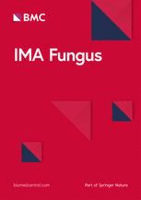
IMA Fungus
Connecting Researchers to the Fungal Frontier.IMA Fungus is an esteemed open-access journal published by BMC, dedicated to advancing research in the fields of fungi, plant sciences, and ecological systems. With an ISSN of 2210-6340 and E-ISSN 2210-6359, this journal has been an influential platform since its inception in 2010, contributing significantly to the scientific community in the United States and beyond. The journal’s remarkable impact can be seen in its Q1 quartile rankings across multiple categories, including Agricultural and Biological Sciences, Ecology, Evolution, Behavior and Systematics, and Plant Science, positioning it among the top literary sources in these fields. Notably, IMA Fungus holds impressive Scopus rankings, with the Agricultural and Biological Sciences category placing it in the 98th percentile, evidencing its crucial role in disseminating impactful research. Given its commitment to fostering accessibility and collaboration, IMA Fungus continues to be an invaluable resource for researchers, professionals, and students aiming to explore and understand the complex roles of fungi within various ecosystems.

Journal of Fungi
Advancing Mycology Through Open Access ResearchJournal of Fungi is a premier open-access journal published by MDPI, dedicated to advancing the understanding of fungal biology in its myriad forms. Since its inception in 2015, it has become a vital resource in the fields of ecology, evolution, and plant sciences, attaining notable rankings in Scopus, including Q1 status in Ecology, Evolution, Behavior and Systematics, and Plant Science, with a Q2 ranking in Microbiology (medical). The journal fosters a collaborative platform for researchers, professionals, and students by providing unrestricted access to high-quality, peer-reviewed articles, which encourages the dissemination of innovative findings and methodologies relevant to fungal research. Designed to cater to a global audience, the Journal of Fungi has established its significance in the scientific community, especially from its base in Switzerland, where it continues to contribute to the ongoing discourse in mycology and beyond. With its commitment to open access since its launch and its continuous support for groundbreaking research, the journal plays a crucial role in driving forward the scientific inquiry and ecological awareness in fungal studies.
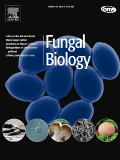
Fungal Biology
Advancing Mycology Through Innovative ResearchFungal Biology, published by Elsevier Science Ltd, is a premier journal dedicated to advancing the field of mycology and its interdisciplinary applications. With an ISSN of 1878-6146 and E-ISSN 1878-6162, this journal serves as a vital platform for researchers and professionals interested in the ecological, evolutionary, and genetic aspects of fungi, as well as their implications in infectious diseases and plant sciences. As of 2023, it proudly holds a Q2 ranking in Ecology, Evolution, Behavior and Systematics and Plant Science, and a Q3 ranking in Genetics and Infectious Diseases, highlighting its significant contribution to these domains. The journal boasts an impressive Scopus rank, including a percentile of 83rd in Ecological studies, ensuring that published research reaches a wide audience and impacts ongoing discourse in the field. With open access options, Fungal Biology encourages the dissemination of high-quality research, aimed to foster collaboration and innovation among scholars and practitioners. With its convergence of knowledge from 2010 to 2024, this journal is instrumental for those advancing the understanding of fungal biology and its myriad applications in environmental and health sciences.

MYCOPATHOLOGIA
Illuminating the complexities of fungal interactions.MYCOPATHOLOGIA, published by Springer in the Netherlands, stands as a pivotal journal in the fields of mycology, plant science, and veterinary microbiology. With its extensive history dating back to 1938, this journal has consistently contributed to the understanding of fungal pathogens and their impact on both agriculture and animal health. It currently holds impressive rankings in Scopus, including Q1 status in Agronomy and Crop Science, and Q2 rankings in Applied Microbiology and Biotechnology, demonstrating its influence and rigor in the scientific community. Researchers and professionals benefit from its curated, high-quality studies which address critical areas such as plant-pathogen interactions and veterinary mycology. While not open access, MYCOPATHOLOGIA emphasizes comprehensive research output and serves as a vital resource for advancing knowledge and fostering innovation in its disciplines. The journal remains committed to disseminating valuable insights that drive forward both academic inquiry and practical applications in related fields, ensuring its relevance and importance in contemporary research.
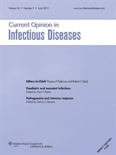
CURRENT OPINION IN INFECTIOUS DISEASES
Leading the Dialogue in Infectious Disease ScienceCURRENT OPINION IN INFECTIOUS DISEASES, published by Lippincott Williams & Wilkins, is a premier journal that focuses on the latest developments and understanding in the field of infectious diseases. With its ISSN 0951-7375 and E-ISSN 1473-6527, this journal has gained recognition for its pivotal role in advancing knowledge from 1988 to its current publications in 2024. Boasting an impressive Q1 ranking in both Infectious Diseases and the Medical Microbiology category, it holds a reputable position among the top journals in the field. The journal serves as an essential resource for researchers, professionals, and students alike, providing them with timely reviews, analyses, and perspectives that shape contemporary practice and policy. While lacking open access options, it ensures a critical examination of emerging trends and unique insights that foster informed discussions. With its consistently high impact factor, CURRENT OPINION IN INFECTIOUS DISEASES remains a vital platform for thought leaders and innovators navigating the complexities of infectious disease research.